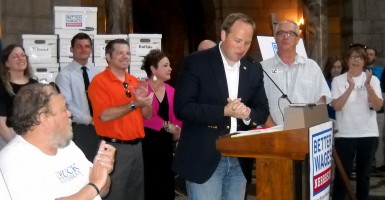LINCOLN, Neb. — Fresh off a rousing success getting Nebraska voters to approve a minimum wage hike, Democratic leaders may take other issues to the ballot box, too.
Medicaid expansion, for example, has been a hot potato in the legislature for the past two years. A bill to expand the program — a key provision in Obamacare designed to cover low-income people — likely would have had enough votes to pass, but didn’t have the super-majority required to beat a filibuster.
With Republicans picking up even more seats in the legislature last Tuesday, Democrats may have better luck with the ballot box than with lawmakers.
“I certainly think that’s a possibility for the future,” said Sen. Jeremy Nordquist, D-Omaha, a leader of the group that promoted passage of the wage hike. “Obviously this has enthused the individuals who supported it financially and volunteered to support the effort.”
No discussions of other ballot measures have happened yet, he said, but polling on another issue — requiring businesses to provide paid sick leave — also found 56 percent support in Nebraska, slightly less than the 60 percent support found for a wage hike. Ultimately, the minimum wage measure passed with 59 percent of the vote.
Michael Saltsman, research director at the Employment Policies Institute, which opposes mandated minimum wage increases, thinks the wage increase passed in four conservative states because there was little-to-no organized opposition in all but South Dakota, which had the slimmest margin of victory.
Nebraskans for Better Wages raised about $1.4 million to promote the ballot measure, but no ballot committee registered to oppose it. Its passage in all four states should be “a lesson to local business groups that if you don’t fight these things, you can’t win,” he said.
Some feared the ballot measure would be a wedge issue that could take down politicians who opposed it, but the election results proved it wasn’t a political kiss of death, he said.
But the ballot measure is believed to have played a role in the stunning ouster of 16-year Republican congressman Lee Terry in Omaha. Nordquist’s group pushed its supporters to vote absentee, and Democratic challenger Brad Ashford won nearly twice as many of those early votes as Terry. Those votes were more than enough to account for Ashford’s margin of victory.
































